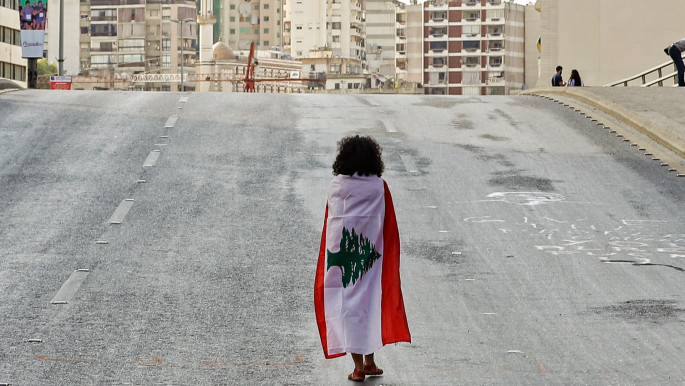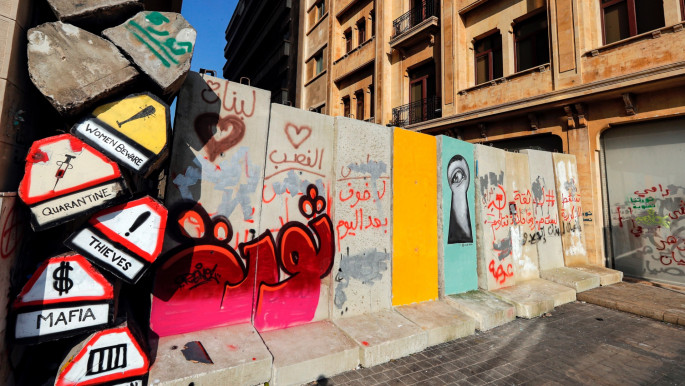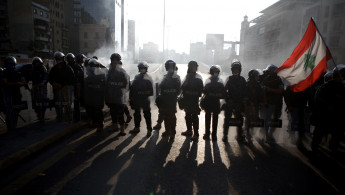'Coronavirus the least of our worries': Lebanese defy lockdown for second wave of protests
Switching from one dystopian decor to another, the recently eerily empty streets of Lebanon due to lockdown measures, including a strict curfew and traffic regulations, are once again left smouldering with police vehicles and banks set on fire as protesters take to the streets.
For these protesters to violate the state-mandated measures reveals how a growing desperation has reverberated across the tiny Mediterranean country.
On Monday, protests were ignited in Tripoli, the second largest city and one of the poorest in the country, before quickly snowballing to other parts of Lebanon, from Beirut, Saida, and Nabatieh to the Bekaa Valley and Akkar.
Simmering tensions in the past weeks due to the deepening economic crisis had already been rapidly intensifying over the weekend.
 |
There has been a re-emergence of protesting tactics that hark back to the days of the October Revolution, indicating a renewal of the movement |  |
The government deployed the Lebanese Armed Forces to re-open roads and dissipate crowds under the pretence that anti-Covid-19 measures must be adhered to in order to mitigate the spread of the virus.
While the Lebanese army expressed its respect for the right to protest and its commitment to protect private and public property in light of increasing attacks on banks, it called upon protesters to end the roadblocks and the vandalisation of public and private property, entering into confrontations with protesters to do so.
On Monday in Tripoli, the Lebanese army opened fire at the crowd, resulting in injuries among protesters, including Fawaz Fouad al-Samman, who succumbed to wounds the following morning.
Al-Samman's death triggered protesters in Beirut to take to the streets in solidarity. At The Ring, protesters blocked the intersection with burning debris, employing the primary tactic of the October Revolution, which many protesters argue was ongoing, but dormant.
 |
|
| Read more: 'We will rise again': Lebanon's revolution is on hold but far from over |
"The revolution never stopped, we were forced to stay home due to the [corona] virus, but the virus, called our government, will kill us before corona does," protester and 'leftist' Zeina, a 24-year old student, told The New Arab. "Corona is the least of our worries."
At the protest at The Ring, the Lebanese army passed out medical masks as protesters mocked soldiers, who are generally universally praised by Lebanese of all sects, referencing a video released by the Lebanese army earlier that day.
The video contrasted the protesters' antagonistic confrontations with previous footage of soldiers handing out aid packages to residents, ending with the quote: "Is this a proper response?"
In the evening, a large group of protesters gathered at Beirut's Martyrs' Square, the heart of the capital city during the October Revolution.
After a short lull, during which some protesters headed home to break their Ramadan fast, demonstrators gathered at the Central Bank headquarters in Hamra before marching through Mar Elias and other boroughs in Beirut.
What started out as a vigil to commemorate al-Samman, quickly escalated, with protesters throwing stones at the Central Bank, which has come to symbolise the country's financial ruin.
Lebanon is experiencing a rapidly deepening economic crisis, resulting in a plunging depreciation of the Lebanese lira. A worker's wage of 600,000 Lebanese lira a month, which has a value of $400 at the official exchange rate, has plummeted to less than $200 at the black-market rate, while price hikes on goods have further decreased people's purchasing power.
 |
The fact protesters have violated state-mandated lockdown measures reveals the growing desperation across Lebanon |  |
Meanwhile, those held responsible for the economic crisis by the public, primarily the government and Central Bank governor Riad Salemeh, have turned the situation into a blame game.
In a televised address early Wednesday afternoon, Salameh alleged that he was the victim of a smear campaign and that accusations concerning inflated spending levels were false.
On the contrary, Salameh insisted that past governments were aware of his decisions and Central Bank budgets and did not oppose either. "There is no unilateralism in decisions… saying the opposite is a fabrication aimed at misleading public opinion," he said.
Salameh was likely referring to PM Hassan Diab, who – in an unprecedented move - publicly rebuked Salameh on Friday by questioning his aptitude after a steep fall in the pound currency and calling on him to clearly explain to the Lebanese people where the policy was headed.
 |
|
"This back and forth between the financial and the political establishment is very ironic. They are pointing fingers at each other, when in reality, they're all very much complicit in the policies throughout the post-war period, if not even before that," Nadim El Kak, a researcher at a local think-tank told The New Arab.
"For Salameh to highlight that the Central Bank does not operate independently from the government and the establishment is very hypocritical. It would mean that there are institutions and laws that are abided by when in reality we know that all of those measures and decisions are geared towards catering to the financial elite, the banks and the political class itself, " El Kak added.
Salameh insisted that reduced dollars in the banks were due to spending on securing fuel, medicine, wheat, and other essential imported goods, citing numbers spent on each. "More transparency than this doesn't exist," he asserted.
Salameh's comments will certainly not ease the protestors' fears, according to El Kak. If anything, they will add fuel to the fire.
"In terms of the practical impact of [Salameh's] speech on people's daily realities, it won't make any difference so we should very much expect the public anger, in general, and the protests, in particular, to manifest even more so on the streets, especially as lockdown measures start to ease down and people start to become more comfortable returning to the streets, " El Kak said.
 |
There will definitely be a re-emergence of the same anger and more violent means of protesting that we were starting to see in the later stages of the first wave of the revolution |  |
"There will definitely be a re-emergence of the same anger and more violent means of protesting that we were starting to see in the later stages of the first wave of the revolution, directed particularly towards banks but also towards politicians and political elites that have very much been complicit in our current financial situation," he added.
Lebanon witnessed further protests across the country on Wednesday, which are poised to continue in the coming days. In Beirut, there is a protest organised Wednesday night at 9pm in front of the Central Bank in Hamra, while calls for larger nationwide protests on Friday are making the rounds on social media.
Farah-Silvana Kanaan is a Beirut-based freelance journalist. She formerly worked as a reporter at The Daily Star
Follow her on Twitter: @FarahKanaan



